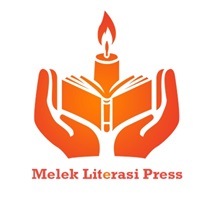IDENTIFYING CURRENT ENGLISH TEACHING PRACTICES OF IMPLEMENTATION KURIKULUM MERDEKA IN SMP NEGERI 1 TOHO
Keywords:
Keywords: English Language Teaching, Kurikulum Merdeka, Junior High School, Learning Strategies, Implementation.Abstract
Abstrak
Penelitian ini bertujuan untuk menganalisis praktik pengajaran Bahasa Inggris dalam implementasi Kurikulum Merdeka di SMP Negeri 1 Toho serta mengidentifikasi tantangan yang dihadapi oleh para guru. Dengan pendekatan studi kasus kualitatif, data dikumpulkan melalui observasi dan wawancara terhadap tiga guru, termasuk koordinator kurikulum dan dua guru Bahasa Inggris, serta observasi di kelas VII-C, VIII-A, dan IX-C. Hasil penelitian menunjukkan bahwa guru telah menerapkan strategi pembelajaran seperti pembelajaran berbasis proyek dan integrasi teknologi, sejalan dengan prinsip Kurikulum Merdeka yang menekankan pembelajaran berpusat pada siswa dan diferensiasi. Namun, tantangan yang dihadapi meliputi keterbatasan sumber daya dan kesiapan guru dalam mengadopsi metode pembelajaran baru. Penelitian ini memberikan rekomendasi bagi pendidik dan pemangku kepentingan untuk meningkatkan efektivitas implementasi Kurikulum Merdeka dalam pengajaran Bahasa Inggris di tingkat sekolah menengah pertama.
Kata kunci: Pengajaran Bahasa Inggris, Kurikulum Merdeka, Sekolah Menengah Pertama, Strategi Pembelajaran, Implementasi.
Abstract
This study investigates the implementation of English teaching practices under the Kurikulum Merdeka in SMP Negeri 1 Toho and identifies challenges encountered by educators. Employing a qualitative case study approach, data were collected through observations and interviews with three teachers, including a kurikulum coordinator and two English instructors. Classroom observations were conducted in classes VII-C, VIII-A, and IX-C, each comprising 30–34 students. Findings reveal that teachers have adopted strategies consistent with Kurikulum Merdeka principles, such as project-based learning and technology integration. However, challenges persist, notably limited resources and the need for enhanced teacher preparedness in adopting new pedagogical methods. The study recommends targeted professional development and resource allocation to bolster the effective implementation of Kurikulum Merdeka in English instruction at the junior high school level.
References
REFERENCES
Astuti, R., Nurhidayati, & Pratiwi, S. (2023). The lack of teacher training and guidance in adopting Kurikulum Merdeka becomes a systemic issue that hinders effective classroom implementation.
Braun, V., & Clarke, V. (2006). Using thematic analysis in psychology. Qualitative Research in Psychology, 3(2), 77-101.
Cadisa, A., & Dwikristanto, B. (2022). Group discussions and constructive feedback enhance student motivation and engagement.
Creswell, J. W., & Plano Clark, V. L. (2018). Designing and Conducting Mixed Methods Research (3rd ed.). Sage Publications.
Fauzi, F., & Sari, D. (2023). Language teaching in Indonesia continues to be dominated by grammatical competence, neglecting the development of practical speaking skills necessary for real-life communication.
Hafis, M., & Widya, R. (2021). Psychological Factors of EFL Students on Speaking Performance. JIIP - Jurnal Ilmiah Ilmu Pendidikan, 4(4)
Hartati, S., Siregar, E., & Sari, N. (2023). Systemic support, including consistent mentoring and monitoring, is necessary to bridge the gap between policy and practice.
Hasballah, M., & Zulfatmi. (2024). Teacher competence and infrastructure as major obstacles in the implementation of Kurikulum Merdeka in remote areas.
Lubis, R. (2025). Weak lesson planning and limited teacher capacity in module development as challenges in Kurikulum Merdeka implementation.
Ministry of Education, Culture, Research, and Technology. (2022). Kurikulum Merdeka aims to develop competencies in both academic and non-academic domains.
Nasution, A. (2023). Limited experience with independent learning concepts, lack of resources, and ineffective time management hinder effective implementation of Kurikulum Merdeka.
Putri, A. N., & Hidayati, N. (2023). Collaborative and project-based learning foster creativity, independence, and communication skills.
Reza, R., & Rohmah, N. (2023). The curriculum’s adaptation to diverse student abilities remains a challenge.
Sahrawi, A., & Kurniawati, D. (2021). One of the important factors in education that must be supported by all parties.
Susanto, H., & Ramadhan, A. (2023). Technological gaps between policy expectations and actual school infrastructure remain a major challenge in rural school contexts.
Turner, D. W. (2020). Purposive sampling approach in educational research.
Widodo, A., & Dewi, S. (2022). Implementing differentiated learning requires strong teacher competence and institutional support.
Widya Rizky Pratiwi. (2024). The success of Kurikulum Merdeka depends on teacher training, infrastructure, and motivating students through engaging teaching approaches.






